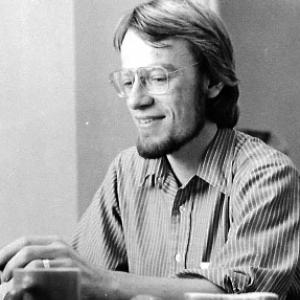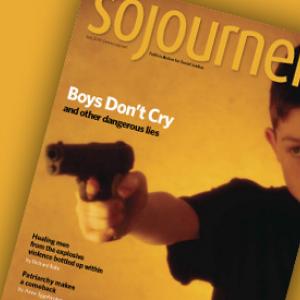
Bob Sabath is a founding member of Sojourners—one of the seminarians at Trinity Evangelical Divinity School that began the magazine with Jim Wallis in 1971. Over the years, Bob has provided expertise in database construction and other computer skills to the Sojourners community as well as contributing spiritual insights through many articles in the magazine. Bob lives with his wife Jackie in Mt. Rainier, MD.
Posts By This Author
In Pursuit of Wholeness
Cynthia Bourgeault explains how we can both seek social justice and do justice to our souls.
Rethinking Success
As individuals, we have to slow down to find our spiritual center. But that doesn't make a very good business plan.
AS MY EXTENDED family gathered around the Thanksgiving dinner table before the latest market crash, conversation with cousins flowed about friends making big money with technology start-ups: “more, more; faster, faster; bigger, bigger; louder, louder.”
A hail of laughter greeted me when I quietly muttered that my ambition was, “poorer, poorer; slower, slower; smaller, smaller; quieter, quieter.”
When Sojourners started in 1971, I was 23 years old. Seven young seminary students pooled $100 each and used an old typesetter that we rented for $25 a night above a noisy bar to print 20,000 copies of the first Post-American, the predecessor to Sojourners magazine. We took the bundles in our trucks and cars to student unions in college campuses across the country and began collecting subscriptions in a shoebox kept in one of our rooms.
For more than a decade, we shared our money in common, trying to live as the early Christians (see Acts 2), and allowed ourselves $5 a month for personal spending. The highest-paid staff person was a young woman from a neighborhood family who wanted an evening cleaning job.
We worshiped together twice a week and opened our homes to our neighbors. When our first child was born, Jackie and I brought him home to a row house in Columbia Heights in D.C. where we were living with 18 other people, including an African-American family and a Lakota couple with some of their extended family from the reservation in South Dakota. You had to be a bit crazy to be in the early community. And yes, we were poor. And we were small.
Poorer, Poorer. Slower, Slower. Smaller, Smaller.
"Be anything you want. Be madmen, drunks, and bastards of every shape and form. But at all costs avoid one thing: success."
- Thomas Merton
As my extended family gathered around the Thanksgiving dinner table before the market crash in 2008, conversation with cousins flowed about friends making big money with technology start-ups: "more, more; faster, faster; bigger, bigger."
A hail of laughter greeted me when I quietly muttered that my ambition was, "poorer, poorer; slower, slower; smaller, smaller."
When Sojourners started in 1970, I was 23 years old. Seven young seminary students pooled $100 each and used an old typesetter that we rented for $25 a night above a noisy bar to print 20,000 copies of the first Post-American.
We took the bundles in our trucks and cars to student unions in college campuses across the country, and began collecting subscriptions in a shoebox kept in one of our rooms.
For more than a decade we lived with a common economic pot and allowed ourselves $5 a month for personal spending. The highest-paid staff person was a young woman from a neighborhood family who wanted an evening cleaning job.
More Resources on Intentional Community
For more on building Christian community, Bob Sabath and Sondra Shepley suggest the following resources (but Bob cautions, “Books a community doth not make!”).
Community That Transforms
An intergenerational conversation on why we need Christian community, and where to find it.
Cyberfaith, Politics, and Culture
A tour of Sojourners Online
As I write, I just finished uploading the most recent issue of Sojourners magazine to our Web site, Sojourners Online. Over the past three years I have posted more than a thousand articles, dating back to November 1994.
It must be acknowledged that cost and other factors will always exclude many people from this technology, but it certainly does have its benefits. Once on our site, for example, anyone in the world can search by any word and find any Sojourners article in which it occurs. After talking with my son about a Bruce Cockburn concert he recently attended, I entered Cockburn’s name in the Sojourners search engine, and instantly found all of the Sojourners articles where Cockburn is mentioned.
If I am preparing a talk on the Sermon on the Mount for my youth Sunday school class, I can find all of the places where Matthew 6 has been used. Our men’s group agreed to discuss Richard Rohr’s article, "Boys to Men" from last month’s issue. I only had one copy of the magazine, and several wanted to borrow it. Then I realized we could all copy it from Sojourners Online. (Yes, we are an enlightened men’s group and all have e-mail and Web connections).
I don’t think the Internet will ever replace books or libraries. An article on a screen can never replace a worn copy of Sojourners that I can curl up with late at night before going to bed. Making Sojourners available on the Web is my way of giving back to others for all that I received during the many years I worked and lived with Sojourners. I believe that there is enduring value in many of the issues and articles that have been published over the years, and this is one way of making them easily and cheaply available to view and use.
Community.Com
Last year I participated in an intensive, nine-month workshop called "Working From the Heart." I wanted to integrate two seemingly divergent eras in my life.
Father Is Still Learning What's Best
When I walk down 13th or Euclid Streets carrying my son Peter in his frayed, blue backpack, he is greeted by people leaning from fourth-floor windows, by children playing in the yards, and by old men sitting on their porches.
The Community of Celebration and Its Renewal Ministry
A brightly colored bus turned the corner into a narrow one-way street in a congested residential area of Washington D.C.
Community with the Poor in Washington DC
From our office window, just three blocks down Vermont Avenue, the White House is clearly visible -- a symbol of the most powerful nation on earth.
The Continental Walk
“We believe that disarmament is the greatest and most urgent challenge facing humanity.”




